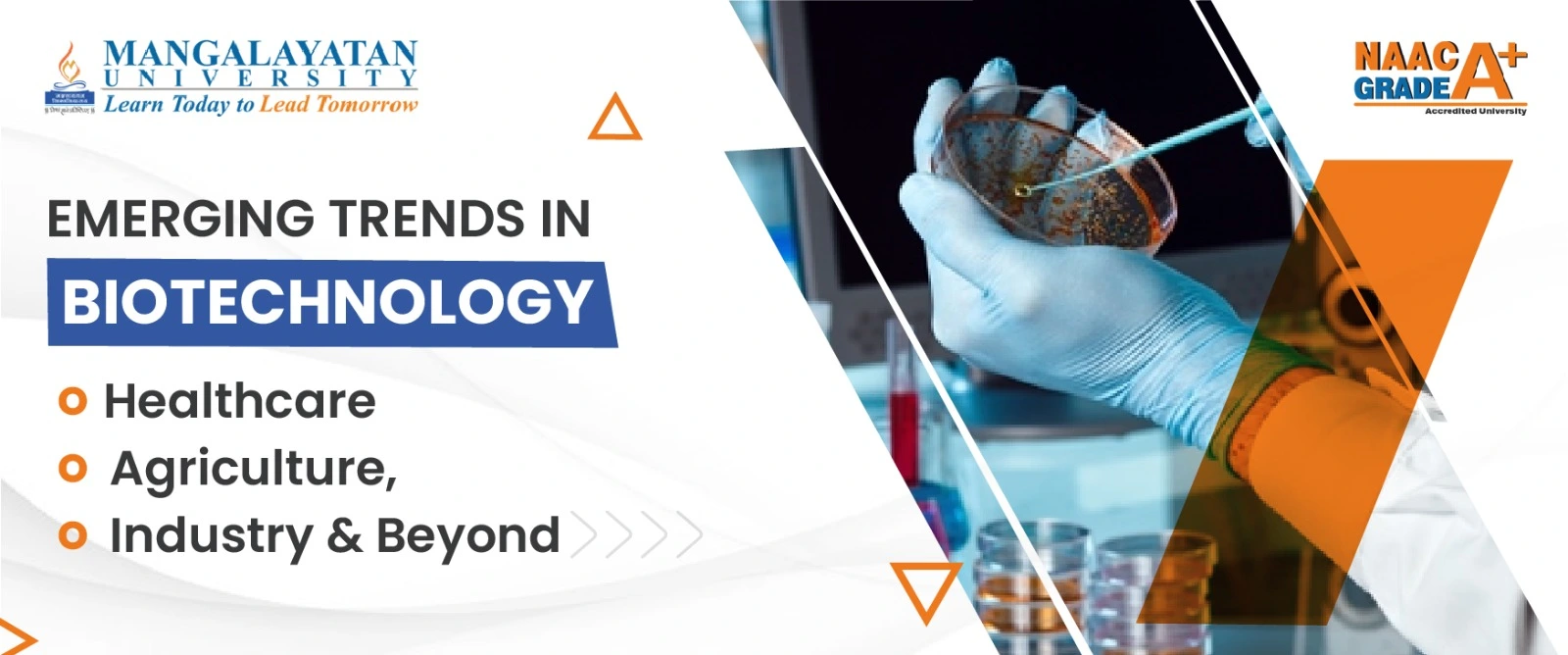Emerging Trends in Biotechnology: Healthcare, Agriculture, Industry and Beyond
Introduction
Biotechnology has played a crucial role in improving human health by developing new medicines and therapies, enhancing food production, and advancing industrial processes. Staying updated with emerging trends in biotechnology is essential for individuals and organizations involved in the field. This is because biotechnology is a rapidly evolving field, and discoveries and innovations are constantly being made.
Staying up-to-date with emerging trends can help professionals in the field make informed decisions, identify new opportunities, and develop innovative solutions to complex problems. It also helps to anticipate potential challenges and risks and to stay ahead of the competition. In short, staying updated with emerging trends in biotechnology is critical for advancing the field and improving the quality of life for people around the world. To learn more about the emerging trends in Biotechnology, continue reading the blog.
1. Biotechnology in Healthcare
Biotechnology Course has revolutionized the healthcare industry by introducing new, innovative ways to diagnose and treat diseases. Precision medicine and personalized therapies are among the latest trends that are transforming the way healthcare is delivered. By analyzing an individual's genetic makeup, doctors can develop personalized treatment plans that are tailored to their unique needs, reducing the risk of adverse reactions and improving outcomes. Gene editing technologies, such as CRISPR-Cas9, have also shown great promise in the development of targeted therapies for a wide range of diseases, including cancer and genetic disorders.
Immunotherapies and cell therapies are other emerging trends in biotechnology that are transforming the way cancer and other diseases are treated. These therapies harness the power of the body's immune system to target and destroy cancer cells, providing a more effective and less invasive alternative to traditional treatments like chemotherapy. Bioinformatics and big data are also playing a critical role in biotech, providing researchers with powerful tools to analyze vast amounts of data and uncover new insights into disease mechanisms and treatment options. As the field of biotechnology continues to advance, the possibilities for improving healthcare are endless.
2. Agriculture and Food Biotechnology
Biotechnology has immense potential to transform agriculture and food production, making it more sustainable, efficient, and nutritious. Genetic modification of crops is one of the most significant advancements in this field, allowing scientists to develop crops that are resistant to pests and diseases, require less water and fertilizer, and have improved nutritional value. These crops have the potential to feed more people with fewer resources, helping to address global food insecurity.
Vertical farming and urban agriculture are other emerging trends in biotechnology that are revolutionizing the way we grow food. These methods use advanced technologies like hydroponics and aeroponics to grow crops in controlled environments, without the need for soil or large tracts of land. This makes it possible to grow fresh produce in urban areas, reducing transportation costs and the carbon footprint associated with food production.
Cellular agriculture and lab-grown meat are also exciting developments in biotechnology, offering a sustainable and ethical alternative to traditional animal agriculture. These methods use cell cultures to produce meat, dairy, and other animal products without the need for live animals, reducing greenhouse gas emissions and animal suffering. As the world population continues to grow, biotechnology will play a critical role in ensuring that we can feed ourselves sustainably and nutritiously.
3. Industrial Biotechnology
Industrial biotechnology is transforming the way we produce energy and materials, making industrial processes more sustainable and environmentally friendly. Biofuels and bioenergy production are among the most significant advancements in this field, providing a renewable alternative to fossil fuels. Bioplastics and bio-based materials are also emerging trends in biotechnology, offering a sustainable alternative to traditional petroleum-based plastics and materials. These products are made from renewable resources like plants and bacteria, reducing the carbon footprint associated with traditional manufacturing processes.
Enzyme engineering is another exciting development in industrial biotechnology, offering a more efficient and sustainable way to produce a wide range of products, from food to pharmaceuticals. By engineering enzymes to perform specific tasks, researchers can develop more efficient and cost-effective processes that require fewer resources and produce less waste. Waste utilization and bioremediation are also important areas of focus in industrial biotechnology, offering innovative solutions to environmental challenges. By using microorganisms to break down waste materials and pollutants, researchers can reduce the environmental impact of industrial processes and clean up contaminated sites.
4. Bioinformatics and Computational Biology
Bioinformatics and computational biology are rapidly emerging fields that are transforming the biotechnology industry. These fields involve the use of computational tools and data analysis techniques to extract insights from vast amounts of biological data. The analysis of big data in genomics, proteomics, and metabolomics is one of the most significant applications of bioinformatics, allowing researchers to identify patterns and relationships that would be impossible to detect with traditional methods.
Computational tools are also playing an increasingly critical role in drug discovery and development. These tools allow researchers to model and simulate the behaviour of molecules and biological systems, providing valuable insights into the potential efficacy and safety of new drugs. The prediction and modelling of biological systems are also essential for understanding complex biological processes and developing new treatments for a wide range of diseases.
Artificial intelligence and machine learning are other exciting developments in bioinformatics and computational biology. These technologies offer powerful tools for analyzing complex data sets, identifying patterns and relationships, and making predictions about biological systems. As the field of biotechnology continues to advance, bioinformatics and computational biology will play an increasingly important role in unlocking the full potential of biotechnology to address some of the most significant challenges facing society today.
5. Bioethics and Regulatory Challenges
The rapid advancements in biotechnology have raised a host of ethical and regulatory challenges that need to be carefully considered. Gene editing, genetic modification, and cloning are some of the most controversial areas in biotechnology, with ethical concerns surrounding issues like genetic enhancement and the potential for unintended consequences. It is essential to balance the potential benefits of these technologies with the potential risks and to ensure that ethical guidelines are in place to protect individuals and society.
Regulatory frameworks are also critical to ensure the safety and efficacy of biotech products and therapies. The development and approval of biotech products require rigorous testing and evaluation to ensure their safety and efficacy. However, regulatory frameworks need to be flexible enough to accommodate the rapidly evolving landscape of biotechnology while also providing adequate protection to patients and the public. It is essential to strike a balance between innovation and regulation to promote the development of new and innovative biotech products while ensuring that they are safe, effective, and ethical.
6. Future Prospects and Opportunities
The prospects of biotechnology are immense and are expected to have a significant impact on healthcare, agriculture, industry, and society as a whole. With precision medicine, gene editing, and immunotherapy at the forefront of biotech research, there is a potential for a paradigm shift in healthcare, providing personalized and targeted treatments for various diseases. In agriculture, biotechnology could lead to sustainable and efficient food production, while in industry, it could drive sustainability and reduce the environmental impact of various processes. Overall, biotechnology is poised to revolutionize many industries, and those with skills and knowledge in this field are likely to be in high demand.
Biotechnology offers a wealth of career opportunities in research, development, and commercialization, with many emerging job roles and skills. As the field evolves, new jobs such as bioinformatics specialists, genetic counsellors, and bioethicists are emerging. Entrepreneurship and start-ups are also potential avenues for individuals with a passion for biotech. There is a growing ecosystem of incubators, accelerators, and venture capital firms focused on biotech, offering resources and support for those looking to start their ventures. With the potential for significant growth and innovation, biotechnology is a field with many opportunities for those with the right skills and expertise.
Conclusion
As biotechnology continues to evolve, it offers a wealth of opportunities for individuals and industries alike. At Mangalayatan University Aligarh, we believe in staying at the forefront of biotech education and research to prepare our students for the future. Our programs in biotechnology and related fields provide students with the skills, knowledge, and hands-on experience needed to excel in this rapidly growing industry.
From precision medicine and gene editing to sustainable agriculture and waste utilization, the emerging trends in biotechnology have the potential to revolutionize various industries and improve our quality of life. As such, it is essential to stay updated with the latest advancements and be prepared to adapt to this rapidly changing landscape. By pursuing a degree in biotechnology at Mangalayatan University Aligarh?, students can gain the skills and knowledge needed to shape the future of biotech.
Join us at Mangalayatan University Aligarh and discover the potential of biotechnology to transform the world we live in. For admission-related queries, contact our administrative team.





